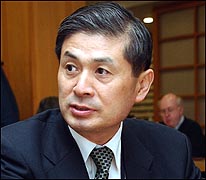A South Korean appeals court today upheld the conviction of Hwang Woo-Suk, the prominent scientist who faked his experiments supposedly showing advances in embryonic stem cell research.
 Still, the court reduced the sentence by reducing the penalty and imposing an 18-month sentence suspended for two years.
Still, the court reduced the sentence by reducing the penalty and imposing an 18-month sentence suspended for two years.
Last October, Hwang received a two-year sentence suspended for three years on conviction of embezzling $719,000 in government funds intended for his research and ethical problems of purchasing human eggs for experiments and using eggs donated from female members of his research team.
Prosecutors appealed the conviction, saying Hwang should also be charged on fraud by fraudulently obtaining funds from local firms and using government-funded laboratories to falsify his work.
The appeals court said Hwang was guilty of embezzlement but not fraud, saying there was no relationship between the funds and his work.
“In 2004 and 2005, Hwang published papers in the journal Science claiming that he had created the first cloned human embryos, and obtained embryonic stem cells from the clones. In late 2005, it was found that Hwang had faked the results. He was indicted on fraud and embezzlement charges,” Dr. David Prentice of the Family Research Council noted.
“Despite the fraud and problems associated with cloning, there are scientists and politicians who still want human clones,” he said.
In 2008, South Korea rejected a request from Hwang to resume embryonic stem cell research.
The Korean Health Ministry cited those problems in its statement about its decision continuing the prohibition on Hwang’s using human eggs in research.
“The decision took into account the chief researcher’s past dismissal from Seoul National University for manipulating research papers in 2005 and ethical questions in procuring human eggs and his indictment for illegally trading in human eggs,” it said.
The scientist is banned from using human eggs in any research but has been engaged in animal cloning at the Sooam Biotech Research Foundation. That’s the company that is teaming up with a California firm to sell cloned dogs.
He played a key role in creating Snuppy, the world’s first cloned dog, and the appeals court said that work should be acknowledged in the reduced sentence.
Hwang and some of his top colleagues were indicted in May 2006 by South Korean prosecutors and charged with fraud, embezzlement and violating bioethics rules. Five members of Hwang’s team were indicted, including one scientist who worked in the laboratory of University of Pittsburgh researcher Gerald Schatten, a former collaborator with Hwang.
Hwang was charged with accepting $2 million in donations after he knowingly falsified the embryonic stem cell research by claiming his team had produced a cloned human embryo and cloned patient-specific embryonic stem cells.
Prosecutor Lee In-kyu also said Hwang embezzled $900,000 in private and government donations to the research. After getting more than $35 billion in research funds from the government and private donors, South Korean prosecutors say Hwang misused much of the money by laundering it through 63 bank accounts set up under false names.
Lee indicated Hwang’s team also paid for human eggs for research, which is a violation of the nation’s bioethics laws.
In the studies his team conducted, Hwang claimed to have created the first cloned human embryo and claimed to have created patient-matched embryonic stem cells that would overcome immune system rejection issues.
Hwang’s team published the results of the research in two papers in the scientific journal Nature, which has since revoked them after learning they were fraudulent.







